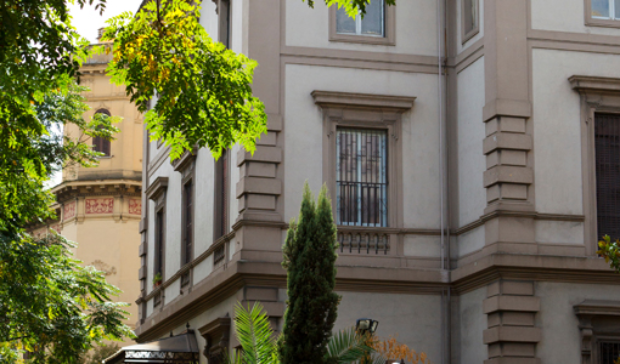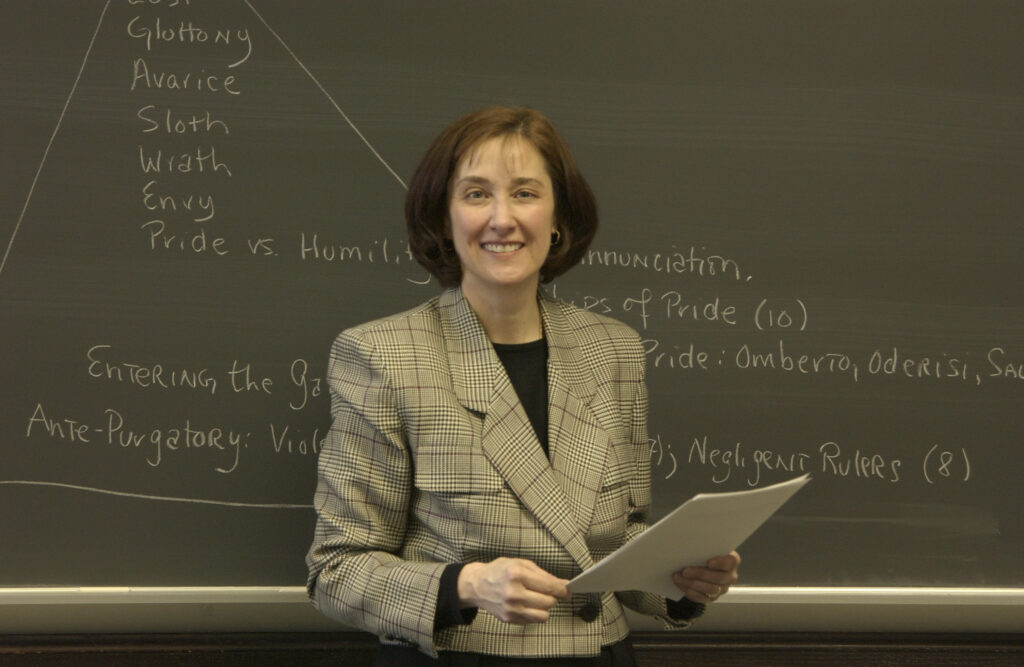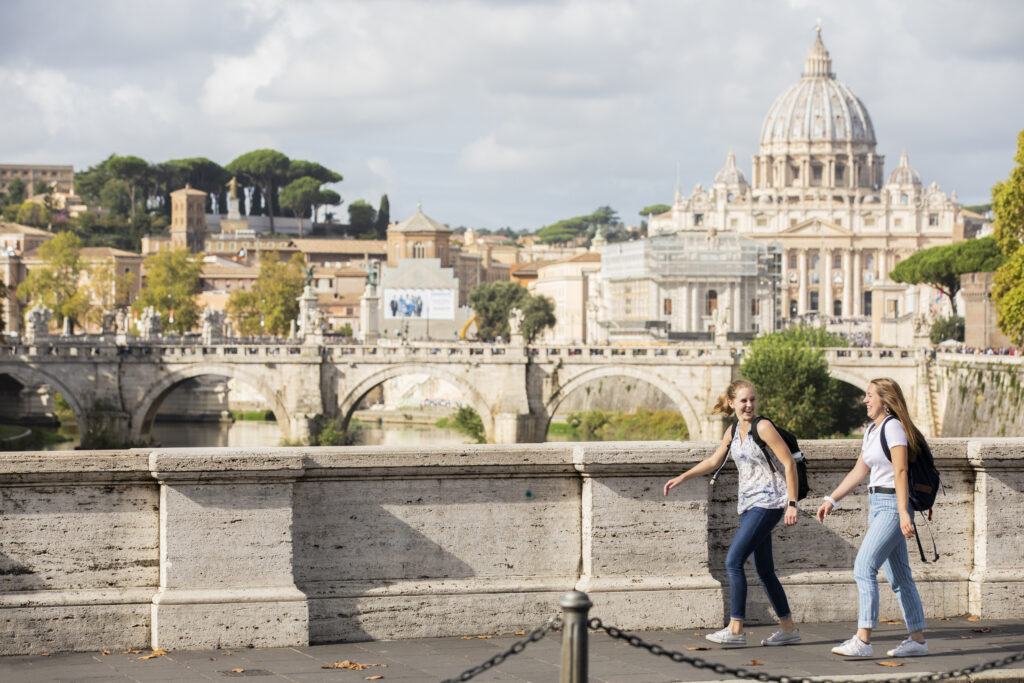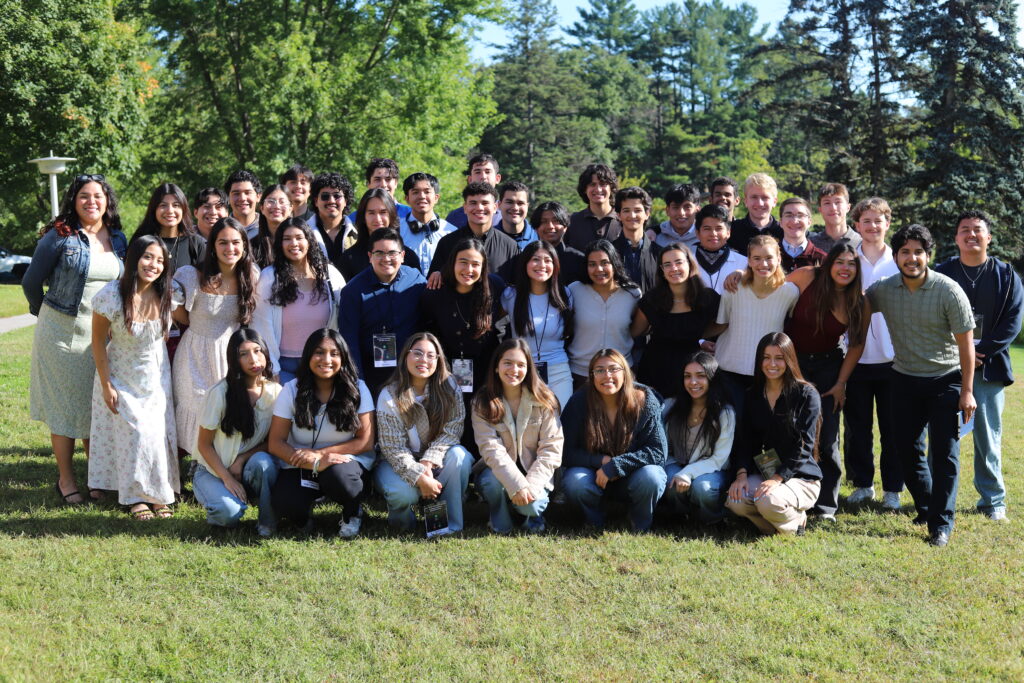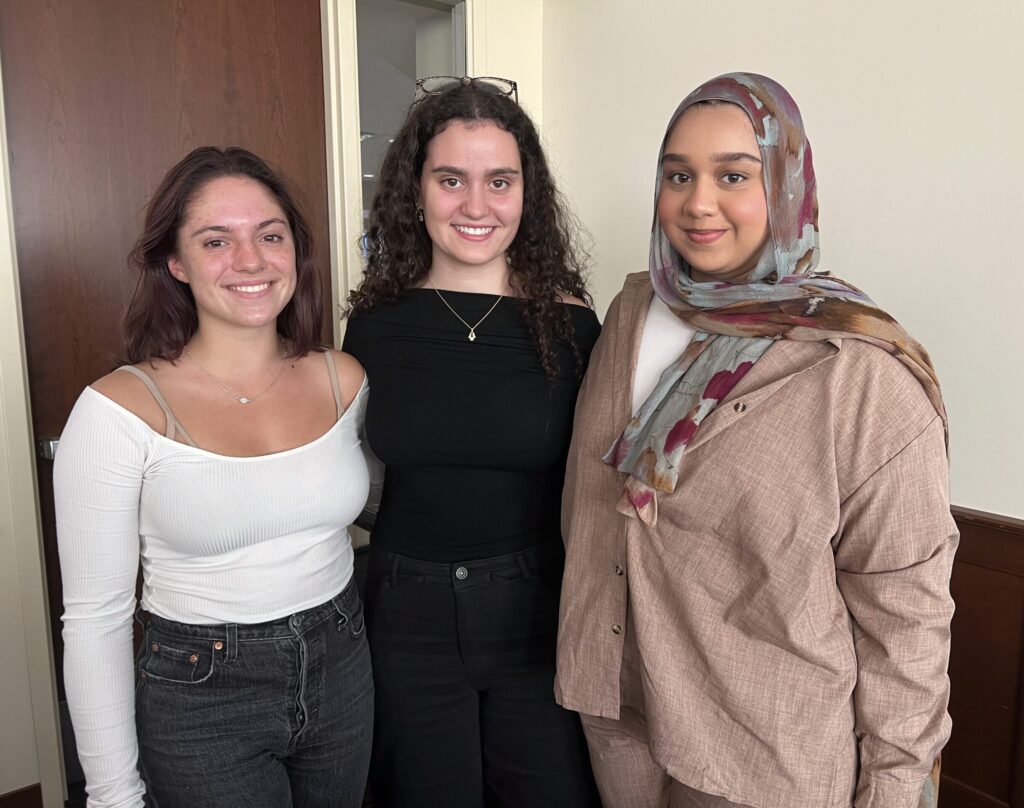Father Mathias Thelen '06Father Mathias Thelen did not grow up wanting to be a priest. “I always wanted to be married,” he says. But as he came to know God in a personal way, things changed. After he joined a youth group in high school, his deepening faith gradually caused his long-term dating relationship to end. He continued to grow, reading the Bible, praying and pursuing God, while he also continued to date and thought that he was called to married life. But one time when he offered his life to God in prayer, he sensed that he was called to the priesthood, but he was very committed to his current girlfriend and told God that she would have to break up with him before he would consider the priesthood. “She came back from a trip and told me we needed to talk. She said, ‘I need to break up with you,’ but she couldn’t explain why. To this day, she still can’t say why.” But Father Mathias knew.
Despite this answer to his prayer, he says, “I was still running from the priesthood,” and he pursued one more relationship with a woman who seemed to be perfectly fitted for him. “As I continued to pray the rosary and go to frequent confession and Eucharistic adoration, Our Lady led me closer to Jesus.” He began to realize that his heart was made not just for one human but for something more, for God himself. “He was giving me the grace to have a heart like Jesus,” he says. He transferred to St. Thomas as a seminarian at St. John Vianney his junior year, majored in Catholic Studies and philosophy and never looked back.
Father Mathis already had been interested in intellectually engaging his faith and the world around him to the point where his research into issues had become more important to him than his classes in engineering and mathematics. When he was at St. Thomas, he found that Catholic Studies enabled him to see the world with Catholic eyes, “from a holistic perspective, in a way that I couldn’t before, like a blind man who was granted sight.” It also trained him to think critically and engage culture and the world with the claims of the Gospel.
Now a priest for the diocese of Lansing at Queen of the Miraculous Medal parish in Jackson, Mich., Father Mathias looks back on his discernment process and draws forth three lessons. “First, don’t hyperdiscern. God is calling you into a deep relationship with him. From that relationship, he will grant you the knowledge of your vocation. Second, give your entire vocation to Mary. She will lead you to your vocation. Finally, make her motto, ‘Let it be done unto me according to thy word,’ your motto.”
Due to its interdisciplinary nature, Catholic Studies prepares students for countless vocations, and our students engage the world in the classroom or in the hospital, in a parish or at home. Some of the many vocations to which our students are called include the priesthood, religious vocations and academic work within colleges and universities. Here are six of our students, now engaging the world as alumni.
Sister M. Faustina Kenney, F.S.G.M. '04As a student, Emilie Kenney, now Sister M. Faustina, majored in Catholic Studies and minored in English and art history. In 2005, she entered the convent of the Sisters of St. Francis of the Martyr St. George, based out of Alton, Ill., where she is in her third year of temporary vows. “In two more years, God willing,” she says, “I will be invited by the community to profess my final vows and become a full member.”
Sister M. Faustina says she was drawn to her Franciscan community because of their joy. “The sisters have a very deep and palpable joy in everything they do, especially in their work.” She also was attracted to the variety of apostolates, including teaching, daycare work, hospital work, housekeeping and cooking for bishops’ households and more. She felt in her discernment that she needed to find a religious community that would allow her to give her artistic talents back to the Lord, and here she found the answer to her longing. She adds, “I was drawn to the community’s charism ‘to make Christ’s merciful love visible,’ and to the basis of their spirituality, ‘They will look on Him whom they have pierced’ (John 19:37). The Franciscan life holds a strong emphasis on the life of Christ and on Scripture, seen in devotions such as their daily praying of the rosary and the Stations of the Cross.”
“It is amazing to serve the Church as a religious sister and to strive to be a witness of a life lived in poverty, chastity and obedience,” says Sister M. Faustina. “It is very humbling and, at times, daunting, but it is incredible to see how God uses the lives of those consecrated to Him to bring His love and healing into the world.” Even in the face of sacrificing, such as limited contact with family and friends, she finds joy. “Our time together has more quality, because we know it is limited.” And while the apostolate can be difficult, as she can be asked to work in unfamiliar areas, she has discovered that the words of their foundress, Mother M. Anselma, are true: “Obedience works miracles.”
Wherever she has been called to work as a sister, she has found that her Catholic Studies education has equipped her to answer many questions people ask her about the Church. “I feel that I have a good understanding of how the Church fits into society and the issues of today. … Also, the personal enrichment that I gained in Catholic Studies has been something I constantly return to for my own growth as a religious.
“A religious vocation is a call or invitation from God that asks for everything. Hand everything over to Him completely in trust and hold nothing back. In return, He will give you everything.”
Brother Austin Dominic Litke, O.P. '04Brother Austin, who majored in a Catholic Studies and classical languages, is a member of the Order of Preachers, commonly known as the Dominicans. He came to St. Thomas as a seminarian at St. John Vianney. His first exposure to religious men’s orders came while he was in college, particularly when he went to Rome and studied at the Angelicum, which has its roots in the Dominican order. Seeing “the vast array of religious life” in Rome, Brother Austin first began to see men’s religious orders as an option. “The seed was planted,” he says, “but I wasn’t ready to act.” In major seminary, he realized that priesthood was a beautiful vocation, but it wasn’t his vocation.
Brother Austin’s time in discernment went quickly – less than a year from when he seriously began considering a religious order to when he joined. He made solemn profession in November 2009 and is now an ordained deacon. “When discerning, it’s easy to get wrapped up in your head,” he says. “The fact that you have a desire is a sign that God might be calling you and bears investigating. Discernment isn’t an end in itself. Just jump in. God will show you if you have made the right choice. We ought not make it so complicated.”
Brother Austin was drawn to the Dominican order because of its emphases on study and fraternity. He finds joy in living his life completely for God and linking the contemplative and the apostolic through his vocation. “It’s a great privilege,” he says, noting that he gets to study and talk about the Gospel all day.
Like others in religious orders, Brother Austin, who is at the Dominican House of Studies in Washington, D.C., faces the challenge of not being able to see his family and friends often. “When friends get married, you can’t just zip up to see them,” he says. But he isn’t so sure that this challenge is all that different from what people outside the religious life face. “As people get married, they aren’t any less committed. Part of this is just becoming an adult.”
Noting the similarities between Catholic Studies and life in the Dominican order, he says, “Catholic Studies is not just an academic pursuit. It forms you intellectually, spiritually and socially. It even incorporates the same idea of service to the community that you find in the apostolate. Life as a Dominican is founded on study, grounded in prayer and lived in community with the goal of preaching the gospel.”
In the end, Brother Austin says he couldn’t be happier than he is in his vocation. “Religious life might look unhealthy, but in the words of Pope Benedict, ‘God doesn’t take anything away when you give it to him. He gives it back and everything else."
Father Andy McAlpin, O.P. '01Like Brother Austin, Father Andy McAlpin is a member of the Dominican order, and he, too, was originally enrolled in seminary. While in seminary, he felt that a sense of community was missing for him. A friend who knew him well suggested that the Order of Preachers fit him. Father McAlpin knew the Dominicans from studying in Rome, so he contacted them and found that the order was, indeed, a good fit for him with its emphasis on community, study and preaching. “I love to preach,” he says. “I have no fear of sharing the love of God before thousands of people.” He joined the Dominicans as a novice in 2003 and has made his final vows and has been ordained.
Father McAlpin lives in community with 10 other men in his order, which brings both the joys and challenges that one experiences in a family. “Living in community challenges me to become holy,” he says. “My brothers challenge me to hard work and dedication to prayer. There’s a sense of camaraderie.” This community stretches across generations. “You have guys who have been ordained for one day as equals with guys who have been in the order 60 years. They have different views of the Church and of the world. What’s important to me isn’t important to an 85-year-old. We have to accept each other for who we are. We’re a bunch of different men, but we can drink wine with each other at the end of the day and laugh – a lot!”
Although he lives in and is shaped by his community, as the director of campus ministry at a Chicago high school, he sometimes can go for a week at a time without sharing an evening meal with his brothers. He has to be in his office early in the morning and sometimes stays late to celebrate Mass or assist with club meetings. He loves the spirit of adventure that comes with being a member of his order. “Opportunities like these aren’t always available to priests. High school chaplaincies are rare. I could be sent to Jerusalem or Rome. I like the sense of not knowing.”
Father McAlpin advises young people in the discernment process to realize that they are already called to something. “You may be confused, but the Holy Spirit isn’t.” He adds, “Sitting outside looking in doesn’t tell you what inside is like. You have time to know if this is wrong for you. It’s unhelpful to be a perpetual discerner. Discernment should take a short time.”
Dr. Matthew Lewis Sutton, '99Matthew Lewis Sutton, Ph.D., assistant professor of systematic theology at St. John’s University in New York, always wanted to teach. Originally, he planned to teach elementary school children, but when he traveled to Rome, he felt an increasing desire to teach at the college level. “My understanding of the goodness of Catholic culture, our faith and our history, grew. I wanted to communicate that to my peers, and I realized that I could do this for a living. Now I do just that on a daily basis.”
A Catholic Studies major with minors in theology and philosophy, Sutton took a year off after graduation and then obtained his master’s degree and Ph.D. from Marquette University. He taught as an adjunct professor for one year at St. John’s University in Minnesota before he found his current position in New York.
One of the most unique aspects to Sutton’s job is his role as faculty-in-residence. St. John’s recently introduced the faculty-in-residence program as an opportunity for students and professors to get to know each other outside the classroom. Sutton’s family has a three-bedroom apartment within a residence of 350 undergraduates. To bring a taste of academic life to the dormitory, Sutton has hosted movies, socials and discussions, and has brought in speakers. Students don’t sign up for the experience, and not all students have the luck to be in a dormitory like Sutton’s. “It’s a side benefit,” he explains. “St. John’s is mostly a commuter school, but it is becoming more residential. We are trying to give a large university a small-university feel. I have a twoyear contract, and I hope it’s renewed. The benefits of this program go both ways.”
Sutton has many research interests, for which he “blames” Catholic Studies. “Most majors are a funnel, leading to specialization,” he says. “Catholic Studies is a reverse funnel. It takes your small interests and expands them even wider.” His greatest interest is in mystical and Trinitarian theology and the integration of these theological points of view, particularly in the work of Adrienne von Speyr.
As part of his teaching method, Sutton engages students through Twitter. “I’m trying to integrate technology to enhance learning,” he says. By posting questions to which his students must tweet answers, Sutton creates a “jumping off point” for an upcoming class. He notes that this draws out normally quiet students who are afraid of discussing ideas in class. “When class starts, we already have been communicating about the class topic.”
His next project? Starting a Catholic Studies program at St. John’s. “I want this to be a manifestation of the university’s mission,” he says.
Dr. Amanda Osheim, '98Amanda Osheim, Ph.D., majored in Catholic Studies and minored in theology and philosophy. This semester, she started teaching theology at Loras College, where she is an assistant professor. This was not her originally intended career path. “I was going to be a diplomat,” she says. She planned to major in international studies, and at the end of her sophomore year she considered transferring to Georgetown University. But she was very involved in ministry, and she found she enjoyed studying theology. “I was having lots of ‘aha!’ moments.” So, she chose Catholic Studies instead. “What drew me to Catholic Studies was the notion of the ‘catholicity’ of the Church and what the Church has to say to and learn from various disciplines,” she says.
Osheim planned to go to graduate school, but she also wanted to do ministry. After graduation, she was a director of elementary faith formation for a year and then returned to St. Thomas in a campus ministry position. Taking advantage of tuition remission for employees, she took one class in psychology, and then a class at The Saint Paul Seminary School of Divinity. Finding she loved her theology class, she pursued an M.A. in theology and then went to Boston College for a Ph.D. in systematic theology.
Osheim’s primary research interest is in the Holy Spirit and ecclesiology. “I’m interested in how the Holy Spirit is discerned in the local church, how the Spirit contributes to the life of the Church and how all this informs doctrinal developments.” Her interest stems from her first ecclesiology class, which gave her the opportunity to really pay attention to the Spirit and its role, seeking answers to questions such as, “How do we recognize and cooperate with the Spirit?”
Osheim enjoys being back in her home state of Iowa. She describes Loras as a small, hospitable college with a welcoming, close-knit faculty and staff. Teaching theology is both a joy and a challenge for her. “I enjoy seeing my students come to ‘aha moments,’” she says. “I like to see them begin to ask deeper questions and apply what they are learning to their own lives.” On the other hand, “you’re teaching about God, about a mystery beyond our ability to articulate. That’s hard.” She also has to help students find the balance between learning the content of theology and exploring how they personally respond to Catholic thought. “I need to say, ‘Here are some definitions,’ but I also need to ask students, ‘What does this mean?’”
Read more from Perspectives
